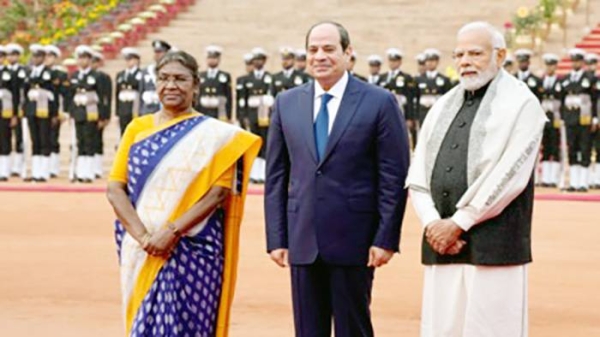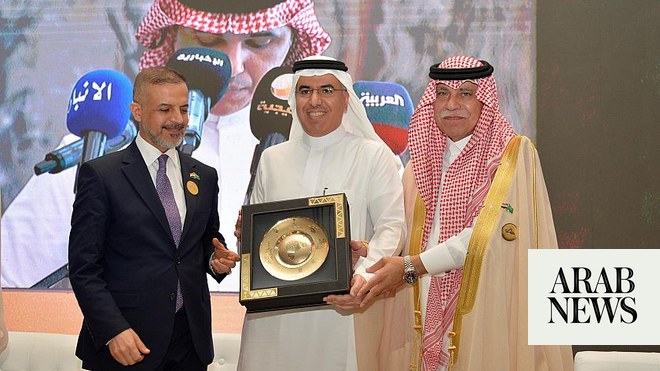
Egypt is considering the possibility of allocating a special area of land for Indian industries in the Suez Canal Economic Zone (SCEZ), a joint statement released by the two countries on the summit meeting said on Thursday.
It added that the Indian side can arrange the master plan for the proposal. The proposal is in the context of India’s offer to encourage its companies, which have the potential to undertake overseas investments, to make use of the available investment opportunities in Egypt.
“Egypt welcomes the flow of more Indian investments and promises to offer incentives and facilities as per applicable regulations and frameworks,” said the statement.
“Both leaders (Indian Prime Minister Narendra Modi and Egypt’s President Abdel Fattah El-Sisi) welcomed the expansion of Indian investments in Egypt, which is currently more than $3.15 billion.
“They agreed to encourage businesses from their respective countries to explore emerging economic and investment opportunities in each other’s countries,” it added.
The two leaders appreciated the strong bilateral economic engagement and expressed satisfaction at the current level of bilateral trade at a record high of $7.26 billion in 2021-22, despite the challenges posed by the pandemic.
“They expressed confidence that a bilateral trade target of $12 billion could be achieved within the next five years by both countries, by diversifying the trade basket and focusing on value addition,” it said.
Egypt and India agreed to elevate their bilateral relations to a strategic partnership on all levels, according to the joint statement.
According to the joint statement, Egypt’s El-Sisi and India’s Modi decided to upgrade the relations between both countries — especially political relations and relations in the fields of security, defense, energy, and economy — to the level of ‘Strategic Partnership.’
“By doing so, the two sides seek to maximize the common interests and exchange support in a bid to overcome the difficulties caused by various consecutive crises and challenges the world is facing,” the statement read.
Politically, both leaders acknowledged the close cooperation between India and Egypt in various multilateral forums and affirmed their commitment to achieving comprehensive reforms of the United Nations Security Council (UNSC), including by expanding both categories of membership and enhancing the representation of developing countries.
Both countries agreed to cooperate when any of them is elected as a non-permanent member of the UNSC. Egypt took note of India’s candidature for a non-permanent membership of the UNSC for the term 2028-29.
Bilateral trade between the two countries recorded an al-time high level in 2021-2022. El-Sisi and Modi hoped that the bilateral trade target of $12 billion could be achieved within the next five years by both countries, through diversifying the trade basket and focusing on value addition.
Both leaders welcomed the expansion of Indian investments in Egypt, currently estimate to be more than $3.15 billion. They also agreed to encourage businesses from their respective countries to explore emerging economic and investment opportunities in each other’s countries.
According to official numbers, around 50 Indian companies are operating in Egypt providing direct employment to approximately 38,000 Egyptians. These companies invest over $3.2 billion across the chemical, energy, automobile, retail, apparel, and agriculture sectors, among others.
Both sides also agreed on enhancing bilateral cooperation in the fields of capacity building. They also agreed to share experiences in the developmental field in view of the success of the Egyptian experience in developing rural areas under the project ‘Decent Life’ and in view of India’s experience in employing technology in fighting poverty.
The statement also affirmed that Egypt and India emphasized their determination to cooperate in the trade of commodities of strategic nature and those required for food security to help both countries contain the repercussions of the global food crisis.
Eighty percent of Egypt’s imported wheat comes from Russia and Ukraine. With the start of the war between Russia and Ukraine, Egypt had to find new markets to import wheat. It found in India a reliable exporter of wheat. Therefore, in May 2022, a deal between Egypt and India was signed to import 61,500 tons of Indian wheat.
On defense cooperation, the Indian premier and Egyptian president expressed concern over the spread of terrorism across the world and condemned the use of terrorism as a foreign policy tool.
They agreed on the need to hold a joint working group on counterterrorism on regular basis to exchange information and best practices. They also agreed on enhancing interaction between their respective National Security Councils.
El-Sisi and Modi also agreed to expand cooperation in the field of space by utilizing India’s expertise in building and launching satellites and space technology applications. They also affirmed the need to strengthen cooperation in space research in areas such as remote sensing, satellite communication, space science, and practical applications of space technology.
Recognizing the challenges posed by the COVID pandemic, particularly to the developing world, the two leaders agreed to cooperate in the health field to ensure more robust global supply chains, enhance preparedness and provide access to healthcare. They also expressed intent to strengthen cooperation in the field of healthcare, drugs and pharmaceuticals.
Concerning green development and the environment, the Egyptian president expressed support for the Indian prime minister’s ‘Lifestyle for Environment’ initiative, while the Indian PM expressed support for President Sisi’s ‘Go Green Initiative’ that aims to change behaviors, spread environmental awareness and urge citizens to protect the environment, natural resources, natural protectorates, and marine life to maintain sustainability.
Both leaders expressed a desire to strengthen cooperation in renewable energy, particularly green hydrogen.
With respect to education, both leaders decided to enhance bilateral partnership by exploring the possibility of further collaboration between Universities in Egypt and the Public Higher Education Institutions (HEIs) of India to facilitate the procedures for establishing a branch of an Indian HEI in Egypt under the framework of the relevant regulations and laws in the two countries.
Recognizing the importance of culture and tourism between India and Egypt, the two leaders agreed to explore possibilities to organize joint festivals, encourage the exchange of visits among pioneering figures in various art forms, explore common cultural elements, encourage translation of literary works, support cinematic creativity, and develop film industry in the two countries.
Concerning tourism, El-Sisi and Modi agreed to work on operating flights between New Delhi and Cairo, which may be followed by the operation of direct flights between other points of call in their respective countries, as per mutual agreement.
El-Sisi’s three-day visit to India, which started on Tuesday, has been described by Prime Minister Modi as “historic” and a “matter of immense happiness” to the Indian people.
President El-Sisi attended Thursday morning the public celebrations of India’s 74th Republic Day as chief guest of honor. Modi and President Droupadi Murmu were also present. — Agencies












